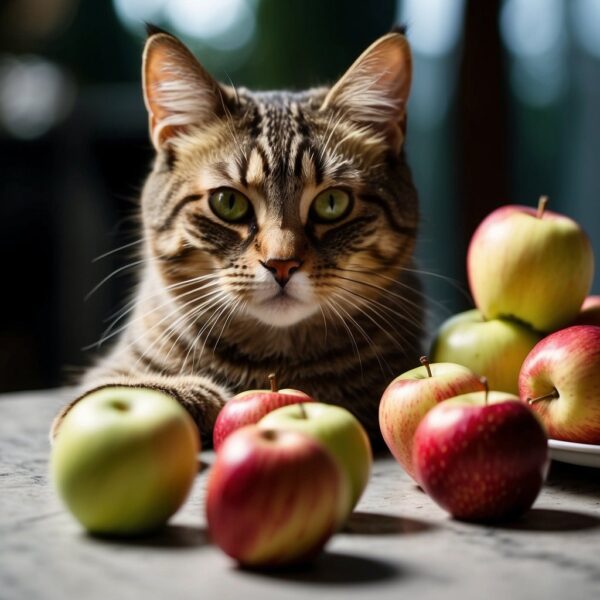
Cats Eating Apples: Risks and Benefits
Cat parents may wonder if cats can eat apples. They might wonder if they can share fruits like apples with their feline friends. While apples are non-toxic to cats, they aren’t a necessary part of their diet. Cats may nibble on apples out of curiosity, but it’s important to remember that cats have different digestive systems than humans. As obligate carnivores, their bodies are not designed to process high amounts of fruits.
If a cat does show interest in apples, these fruits can be given as an occasional treat in small amounts. The flesh of the apple is safe for cats, as it contains vitamins that could potentially benefit their health. However, the apple’s seeds, stem, and leaves must be avoided due to the presence of cyanide compounds which are harmful. Care and moderation are key when introducing any human food to a cat’s diet, and it’s best to consult with a veterinarian before making any significant changes to what a cat eats.
Key Takeaways
- Cats are obligate carnivores, but apples are safe in moderation.
- Apple seeds, stems, and leaves are harmful to cats and should be avoided.
- Consult a veterinarian before introducing new foods like apples to a cat’s diet.
Are Apples Safe for Cats?
When it comes to cats eating apples, it is imperative to consider the potential benefits alongside the risks involved. Apples can be safe for cats in small quantities if the correct parts of the fruit are offered and safety precautions are taken.
Potential Benefits of cats eating Apples
Apples contain vitamins such as vitamin C and vitamin K, as well as calcium and fiber, which can be beneficial to a cat’s health in moderation. The antioxidants present in apples could offer some health advantages, although cats process nutrients differently than humans do.
- Vitamins: Support general health
- Calcium: Contributes to bone health
- Fiber: Aids in digestion
Risks Associated With Feeding Cats Apples
Despite the potential benefits, there are considerable risks when feeding apples to cats. The seeds, stems, and leaves of apples contain cyanide, a substance that is toxic and potentially poisonous to cats. Ingestion of these parts of the apple must be strictly avoided.
- Seeds, Stems, Leaves: Contain cyanide, which is toxic to cats
- Digestive Issues: Too much apple can cause vomiting or diarrhea in cats
- Sugar Content: High sugar levels in fruits like apples are not ideal for cats’ carnivorous diet
It is crucial for cat parents to ensure that any apple offered to their cat is peeled, and that the flesh is free from seeds. Apples should only be given in small, infrequent portions to prevent any adverse effects on the cat’s health.
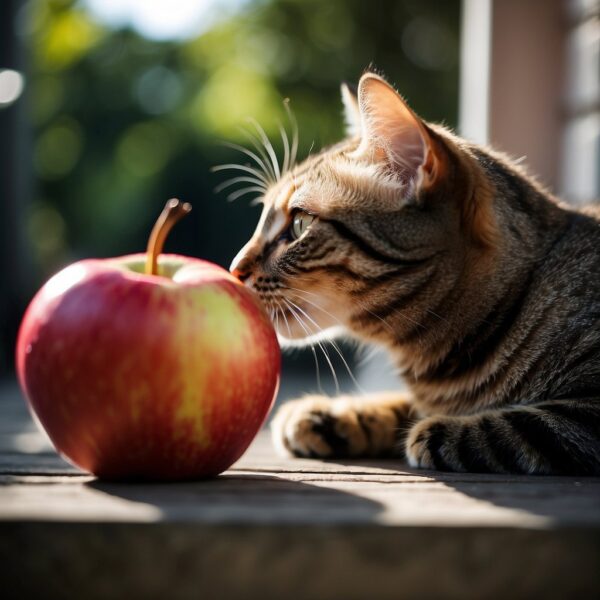
Nutritional Aspects of Apples
Apples contain a range of nutrients that are beneficial to humans, but their value to felines is limited due to the different dietary requirements of cats.
Vitamins and Minerals in Apples
Apples provide a spectrum of vitamins and minerals including vitamin A, vitamin C, and vitamin E, as well as minerals like potassium, copper, calcium, and manganese. These nutrients play various roles in bodily functions such as vision, immune system health, skin maintenance, and enzymatic reactions.
- Vitamin A: Essential for good vision, immune function, and skin health.
- Vitamin C: Important for immune system support and antioxidant activity.
- Vitamin E: Helps protect against oxidative damage.
- Potassium: Necessary for proper nerve and muscle function.
- Copper: Involved in iron metabolism and the formation of red blood cells.
- Calcium: Crucial for bone health.
- Manganese: Plays a role in bone formation, blood clotting, and reducing inflammation.
Sugar and Fiber Content
Apples are naturally high in sugar and dietary fiber. The sugar content can impact blood sugar levels, needing cautious consideration for cats with conditions like diabetes. Fiber, while aiding in digestion, can also cause gastrointestinal upset in cats if consumed in excessive amounts.
- Sugar: Can cause swings in blood sugar levels.
- Fiber:
- Soluble Fiber: Can help with digestion.
- Insoluble Fiber: May cause digestive upset if your cat eats too much.
Antioxidants and Phytonutrients
Antioxidants and phytonutrients in apples, such as pectin, can contribute to overall health benefits like supporting the immune system and reducing inflammation. However, the impact of these compounds in cats is less understood as their primary nutritional needs are met through animal-based proteins rather than fruits.
- Antioxidants: Help neutralize harmful free radicals in the body.
- Phytonutrients: May support immune health and protect against chronic disease.
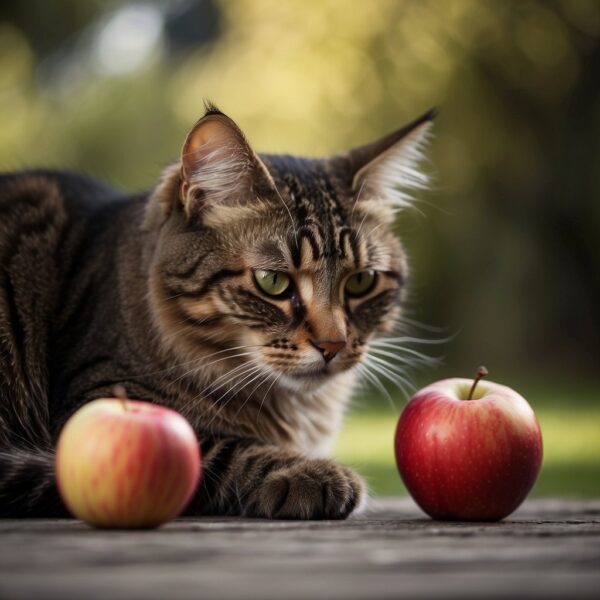
Preparing Apples for Cats
When offering apples to cats, it’s essential to prepare them safely to avoid any potential health risks, ensuring they are served in a cat-friendly manner without additives that could be harmful.
Suitable Forms of Apples
Cats can eat applesauce and raw apple as part of their diet, provided these are given in moderation. Apples should be served without any added sugars or spices. Fresh fruit is the most suitable form, with raw apples being washed, cored, and cut into small, manageable pieces to prevent choking. Homemade applesauce can be a good option, as long as it is pure and does not contain any added ingredients like sugar or spices.
Unsafe Apple Products
Several apple products are unsafe for cats. Candy apples are particularly harmful due to their high sugar content and potential choking hazard. Additionally, apple juice, cooked apples with added ingredients, and dried apples should be avoided. These items often contain added sugars and spices that can be dangerous to a cat’s health.
cats should eat apples in Moderation
Moderation is key when feeding apples to cats. Apples should only make up a small fraction of a cat’s calorie allowance to prevent weight gain and should not replace their regular, balanced diet. A few small pieces are ample for a cat, considering their small size and the sweetness of apples, which is not a necessary component of their diet.
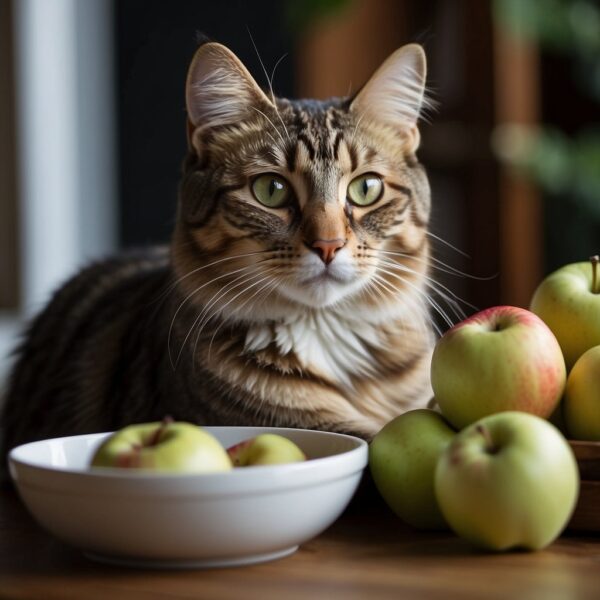
Understanding Cats’ Dietary Needs
Cats have specific dietary requirements that stem from their nature as obligate carnivores. Their diet must include certain nutrients that are primarily found in animal products to maintain optimal health.
Obligate Carnivores and Nutrition
Cats are obligate carnivores, which means they require a diet primarily composed of meat. Protein from animal sources is essential for their survival, as it contains amino acids like taurine that cats cannot synthesize on their own. Unlike omnivores, cats have a limited ability to digest plant-based nutrients, making animal products crucial for their diet.
Typical Components of a Cat’s Diet
A typical diet for a cat should primarily include:
- Proteins: High-quality animal meats that provide essential amino acids.
- Fats: Animal fats are necessary for energy and absorption of fat-soluble vitamins.
- Vitamins: Vitamins A, D, E, and K are vital and mostly found in animal products.
- Minerals: Calcium and phosphorus are crucial for bone health and metabolic processes.
Most of these requirements are met by feeding cats a balanced commercial diet designed specifically for feline nutritional needs.
Health Conditions Affecting Diet
Certain health conditions, such as obesity and diabetes, can impact a cat’s diet. It’s important to moderate calorie intake and ensure a balanced diet to prevent and manage these conditions. Obesity in cats can lead to numerous health issues, including diabetes, which may require dietary adjustments to optimize blood sugar levels. Additionally, some cats may have specific dietary needs due to other health-related issues, which should be addressed with a veterinarian’s guidance.
Feeding Guidelines and Alternatives
When introducing apples or other foods into a cat’s diet, it’s crucial to consider the appropriate serving size and frequency, ensuring the cat’s established nutritional needs are met without causing gastrointestinal issues.
how cats can eat apples safely
Apples can be a healthy snack for cats if given in moderation. They should be thoroughly washed, peeled to remove any pesticide residue, and cored to eliminate the choking hazard posed by seeds and stems. Cats may safely enjoy one or two small 1/4-inch apple squares as an occasional treat, which should not exceed 10% of their daily caloric intake to prevent digestive upset or an imbalance in their nutritional intake. Continuous monitoring of a cat’s blood sugar is also important as apples contain natural sugars.
Safe Fruits and Vegetables for Cats
In addition to apples, cats can occasionally have other safe fruits and vegetables that are cleaned and suitably prepared. Some of these foods include:
- Blueberries and strawberries: Offered whole or mashed in small amounts.
- Cantaloupe: Cut into small, bite-sized pieces.
- Carrots, pumpkin, and broccoli: Cooked to improve digestibility, served in moderation.
Certain human foods like grapes, raisins, bread, and any vegetarian diets high in by-products or unfriendly to carnivorous digestion are not advised for cats. These items can lead to serious health issues, including kidney damage or gastrointestinal problems.
Seeking Veterinary Advice
Before making any changes to a cat’s diet or introducing new treats, such as apples, it is important to consult with a veterinarian. This is especially critical for cats with pre-existing conditions or cats that are on a strict dietary regimen. Professional veterinary care will provide personalized advice tailored to the individual cat’s health status and nutritional needs.
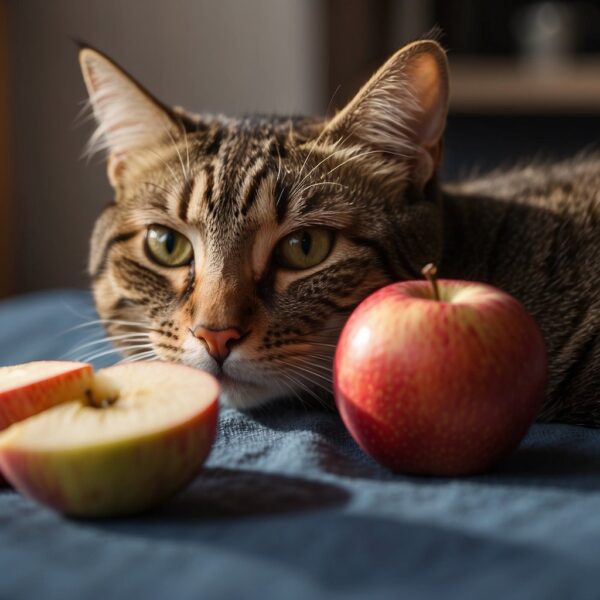
Frequently Asked Questions
In this section, commonly asked questions about feline dietary considerations concerning apples are addressed to guide cat owners on safe feeding practices.
Is it safe for cats to consume apple flesh?
Yes, cats can safely consume the flesh of apples in small amounts. Apple flesh can be a source of vitamins and fiber for cats; however, it should always be served without seeds or core due to potential choking hazards and toxicity from the seeds.
Are there any health benefits or risks for cats eating apple skin?
While the skin of an apple may contain additional fiber and nutrients, it is important for cat owners to wash the apple skin thoroughly to remove any pesticides or chemicals. Small amounts of apple skin can be offered to cats, but large quantities may cause digestive upset.
What types of fruit are safe for my cat to eat?
Cats can eat certain fruits in moderation, including blueberries, melon, and peeled apples. However, always avoid grapes and raisins as they are toxic to cats. It is essential to introduce any new fruit slowly to monitor for adverse reactions.
Can the ingestion of applesauce be harmful to cats?
Applesauce can be safe for cats if it is plain and does not contain added sugars or spices. It is easier to digest than raw apple but should still be given in moderation as a treat, not as a meal replacement.
Why might a cat show interest in eating apples?
Some cats may show interest in eating apples out of curiosity or due to the fruit’s texture or flavor. However, as obligate carnivores, their primary diet should be high in proteins, and fruits should only be a minimal part of their diet.
What human foods are generally considered safe for cats?
Human foods considered safe for cats in small quantities include cooked meats like chicken or turkey, certain fish, cooked eggs, and some vegetables like green beans or carrots. Always ensure that any human food given to cats is plain and free from toxic ingredients like onion or garlic.